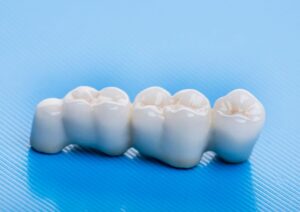
A traditional dental bridge can provide sturdy and cost-effective tooth replacement. It also has the potential to serve you well for a long time; many people find that their bridge lasts for a decade or longer! In some cases, though, bridges fail prematurely. What could cause that to happen, and what steps should you take to protect your restoration? This blog post explains.
Missteps in Oral Hygiene
Even though a dental bridge cannot develop cavities, the teeth that support it (known as abutment teeth) are still susceptible to decay. Bacteria could sneak beneath the restoration and attack the underlying dentition, gradually destroying it. If the abutment teeth become too weak, the bridge on top of them may fail.
To prevent this problem, you should make it your goal to stick to good oral hygiene habits every day. Be sure to brush and floss regularly, and always clean the area along your gumline. It is also beneficial to use a floss threader or water flosser to clean beneath your bridge.
Physical Trauma
Overexposure to physical force could cause significant damage to a dental bridge. To protect your restoration, you should:
- Avoid biting down on hard objects. For example, you should not bite on hard candies or ice cubes. You also need to be cautious when eating food with hard parts, such as bone-in meats and popcorn.
- Do not grind and clench your teeth. If you engage in nocturnal teeth grinding and clenching, ask your dentist if you are a candidate for a custom mouthguard that could protect both your teeth and your bridge.
- Wear a mouthguard during sports. A custom mouthguard can greatly reduce the risk of oral injury and prevent damage to your bridge.
Lack of Bone Support
The abutment teeth that serve as the base of your bridge are anchored in your jawbone. Unfortunately, gum disease or other factors could seriously damage the bone, taking away its ability to keep your teeth firmly in place.
Good oral hygiene, regular dental checkups, a balanced diet, and avoiding the use of tobacco products can do much to promote jawbone health.
Lack of Regular Professional Care
Try to visit your dentist once every six months for a cleaning and exam. During these visits, your dentist can evaluate your bridge for signs of damage and provide personalized coaching to help you take care of it. Neglecting these routine appointments could very well contribute to early dental bridge failure.
Your dental bridge could last for a long time, but only if you do your best to prevent circumstances that may cause it to fail.
Meet the Practice
Dr. Erin Page has been serving patients for well over a decade. Throughout her accomplished career, she has completed extensive continuing education. She is proud to offer dental bridges, preventive services, and a wide range of other treatments. If you would like her and our team to help you enjoy optimal oral health, contact Capital Smiles in Schenectady at 518-374-0317.
